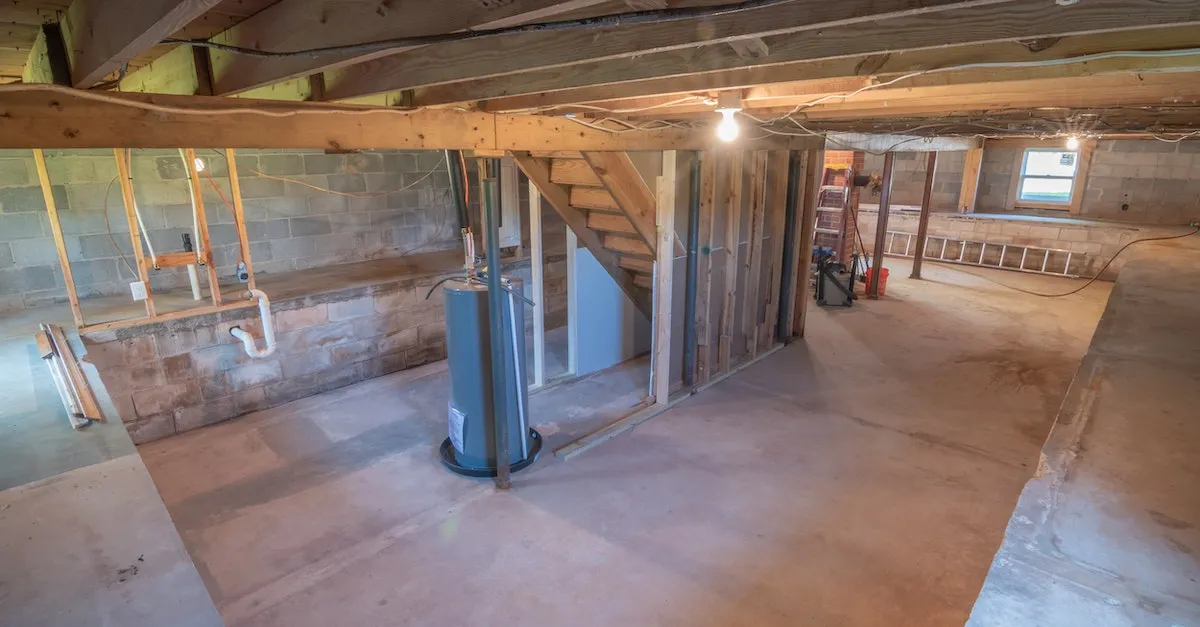Are There Basements In California?
With its mild climate and rising housing costs, California real estate is prime territory for maximizing living space. So are basements an option for adding extra square footage? In this comprehensive guide, we’ll explore the feasibility of basements in California homes.
If you’re short on time, here’s a quick answer: While not common, some homes in California do have basements, though certain factors limit their prevalence throughout the state.
Basement Popularity in California
When it comes to basements, California is not known for having an abundance of them. In fact, basements are relatively uncommon in the state compared to other parts of the country.
Low Overall Numbers
One reason for the lack of basements in California is the geological makeup of the state. The presence of earthquakes and the potential for shifting ground make it more challenging to construct basements that can withstand these natural forces.
As a result, many homeowners and builders opt for alternative methods of creating additional living or storage space, such as adding on to the existing structure or utilizing attics and garages.
Additionally, the mild climate in many parts of California reduces the need for basements. Unlike areas with harsh winters, where basements provide extra insulation and protection from the cold, California’s moderate temperatures make basements less necessary for residential properties.
Regional Differences
While basements may be uncommon throughout the state, there are some regional differences in their prevalence. In areas closer to the coast, such as Los Angeles and San Francisco, the availability of land is limited, and the cost of construction is high.
This, coupled with the challenges associated with earthquakes, has led to a lower number of homes with basements in these areas.
On the other hand, in inland regions like the Central Valley and parts of Northern California, where land is more abundant and construction costs may be lower, basements can be found in a higher percentage of homes.
However, even in these areas, basements are still not as prevalent as in other parts of the country.
Historic Basements
While basements may not be common in modern construction, there are exceptions in older homes and buildings throughout the state. Some historic properties, particularly those built in the early 20th century or earlier, may have basements that were constructed for various purposes, such as storage, wine cellars, or even secret passageways.
These basements serve as a reminder of California’s architectural heritage and the different construction practices of the past.
Limiting Factors for Basements
While basements are a common feature in many homes across the United States, they are not as prevalent in California. There are several limiting factors that contribute to the scarcity of basements in this region. These factors include seismic/geologic conditions, high water tables, and high costs.
Seismic/Geologic Conditions
One of the primary reasons why basements are not commonly found in California is due to the state’s unique seismic and geologic conditions. California is located in an area prone to earthquakes, and the ground can shift and move during seismic activity.
This movement can put immense pressure on basement walls, potentially leading to structural damage. As a result, many homeowners and builders opt for alternative construction methods that are better suited to withstand earthquakes.
According to the U.S. Geological Survey, California experiences thousands of small earthquakes each year, along with occasional larger ones. This constant seismic activity makes it more challenging to construct basements that can withstand the forces generated by such events.
High Water Tables
Another factor that limits the presence of basements in California is the region’s high water tables. A water table refers to the level at which the ground is saturated with water. In areas with high water tables, building a basement becomes more difficult due to the risk of groundwater seepage and flooding.
California, particularly coastal areas, is known for its high water tables. The proximity to the ocean and other bodies of water contributes to the saturation of the ground with water. Building a basement in such conditions would require extensive waterproofing measures to prevent water damage and mold growth.
High Costs
Lastly, the cost of constructing a basement in California is often a deterrent for homeowners. Building a basement requires excavation, foundation work, and additional structural support, which can significantly increase the overall construction costs of a home.
According to a report by the California Building Standards Commission, the average cost of building a basement in California can range from $50,000 to $150,000 or more, depending on various factors such as the size of the basement and the complexity of the construction.
Considering the seismic risks and high water tables in the region, many homeowners and builders opt for alternative solutions such as crawl spaces or raised foundations, which are more cost-effective and better suited for California’s unique conditions.
Building Code Challenges
California, known for its beautiful weather and stunning landscapes, poses unique challenges when it comes to building codes. One of the most common questions asked is whether or not basements are allowed in California.
Let’s explore the building code challenges that make basements a rarity in this state.
Strict Regulations
California has some of the strictest building regulations in the country. These regulations are in place to ensure the safety and well-being of residents. When it comes to basements, the stringent codes make it difficult to construct them.
The California Building Standards Code, also known as Title 24, sets forth guidelines that must be followed during construction. These guidelines cover everything from structural integrity to fire safety, making it challenging for builders to meet all the necessary requirements for basements.
Groundwater Control Requirements
One of the primary reasons why basements are uncommon in California is the issue of groundwater control. California is prone to earthquakes and has a high water table, making it challenging to keep basements dry.
The risk of flooding and water damage is a significant concern, leading many builders to opt for alternative construction methods such as crawl spaces or raised foundations. These methods help mitigate the risk of water intrusion and provide a more stable foundation for homes.
Egress Rules
Another factor that makes basements rare in California is the strict egress rules. Egress refers to the means of exit in case of an emergency. California requires basements to have a secondary means of egress, typically in the form of windows or doors.
However, due to the unique geography and architectural styles in California, providing adequate egress can be a challenge. This further discourages the construction of basements in the state.
When Basements Make Sense
Basements are a common feature in many homes across the United States, providing additional living space and storage areas. However, when it comes to California, the presence of basements is not as widespread. The question arises, are there basements in California?
Let’s explore the factors that determine when basements make sense in this region.
Custom Luxury Homes
When it comes to custom luxury homes, basements can be found in certain areas of California. Homeowners who are building their dream homes often opt for basements to accommodate amenities such as home theaters, wine cellars, or even recreational areas.
These basements provide an opportunity to maximize space and create a luxurious living experience. However, it’s important to note that basements in custom luxury homes are not as common as in other parts of the country.
High Value Areas
In high-value areas of California, basements may be more prevalent. These areas typically have higher land prices, and homeowners look for ways to increase their usable living space without expanding the footprint of their homes.
Basements can provide an economical solution to this challenge, allowing homeowners to add extra square footage without the need for extensive construction. These basements are often used as additional bedrooms, entertainment areas, or even home offices.
Large Properties
On large properties, especially in rural areas, basements can be found more frequently. Homeowners with ample land may choose to build basements to take advantage of the available space and create functional areas below ground level.
This is particularly common in agricultural areas where large properties are the norm. Basements on these properties can serve various purposes, such as housing equipment, acting as storm shelters, or providing storage for crops or livestock supplies.
While basements are not as common in California as in other parts of the country, there are instances where they make sense. Factors such as custom luxury homes, high-value areas, and large properties play a role in the presence of basements.
If you’re considering a home in California and are specifically interested in having a basement, it’s essential to discuss your preferences with a real estate professional who can guide you towards properties that meet your requirements.
Basement Alternatives in California
California, known for its sunny weather and earthquake-prone geography, is not typically associated with basements. Due to the state’s unique characteristics, basements are not as common in California as they are in other parts of the country.
However, there are several basement alternatives that homeowners in California can consider.
Attached ADUs
One popular alternative to basements in California is the construction of Accessory Dwelling Units (ADUs). ADUs are separate living spaces that can be attached to an existing home or built as a standalone structure on the property.
These units can serve as guest houses, rental units, or even home offices. They provide additional living space without the need for a traditional basement.
According to a report by the California Department of Housing and Community Development, the number of ADUs in California has been steadily increasing in recent years. In fact, between 2017 and 2019, the number of permits issued for ADU construction more than tripled.
This shows the growing popularity of ADUs as a basement alternative in the state.
Crawl Spaces
Another alternative to basements in California is the use of crawl spaces. Crawl spaces are shallow areas beneath a home that provide access to plumbing, electrical, and HVAC systems. While crawl spaces do not offer the same level of usable space as a basement, they can still be used for storage and provide easy access to essential home infrastructure.
Many homes in California are built with crawl spaces instead of basements due to the state’s geological conditions. The presence of earthquakes makes it more challenging to construct basements, as they are more prone to damage during seismic activity.
Crawl spaces provide a safer alternative that can withstand the ground movements associated with earthquakes.
Sunken Patios
For homeowners looking to create an outdoor living space, sunken patios can be a great alternative to basements. Sunken patios are built below ground level, providing a cozy and private outdoor area. They can be designed with seating areas, fire pits, and even landscaping, creating a unique and functional space for entertaining or relaxation.
Many Californians have embraced the concept of sunken patios as a way to maximize their outdoor living experience. The mild climate in the state allows for year-round use of these outdoor spaces, making them a popular choice for homeowners looking to enhance their backyard areas.
While basements may not be as common in California, homeowners have several alternatives to choose from. Whether it’s attached ADUs, crawl spaces, or sunken patios, Californians can still enjoy additional living or storage space without the need for a traditional basement.
Conclusion
While less common than in other parts of the country, basements can be found in parts of California where conditions allow. However, seismic risks, high water tables, and strict building codes limit their feasibility for most homes. Savvy homeowners employ creative alternatives to add space and value within the state’s unique landscape and regulations.








